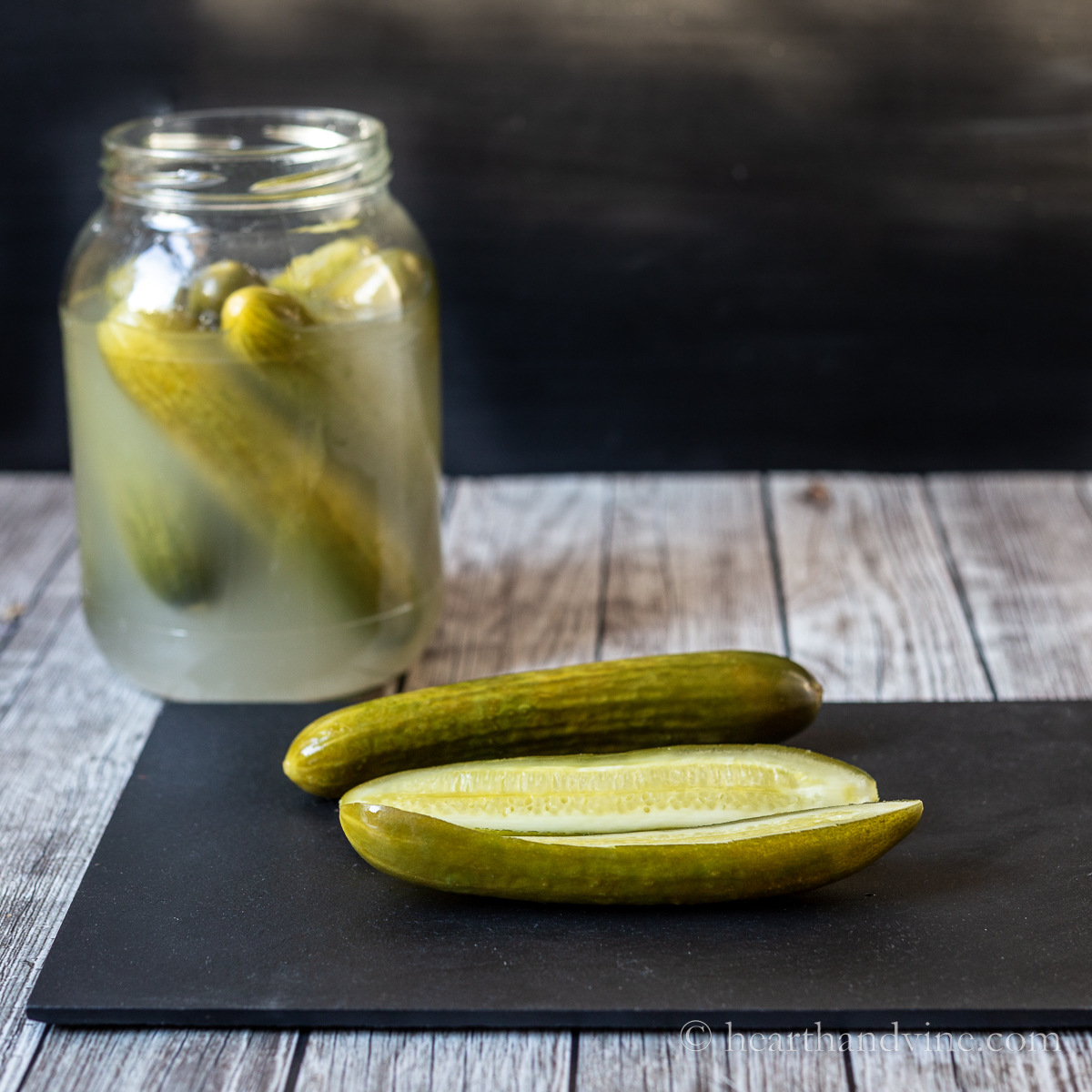Fermented Pickles with Garlic and Dill
by Admin
Posted on 26-09-2023 02:59 PM

This post may contain affiliate links. Read my full disclosure policy.
 How to make manhattan-style fermented pickles with garlic and dill! an easy step-by-step guide to making the most flavorful, crunchy, tangy pickles full of healthy probiotics, with only 20 minutes of hands-on
time
! the pickle brine is like a “tonic” -drink a shot of it daily to help build immunity! video. What happens when people open their hearts? they get better. ~haruki murakami
i’m excited to share this easy recipe for fermented pickles with you! if you are a crunchy pickle lover like me, you will be in heaven. Seriously, these are the best! these manhattan-style “half-sour” fermented dill pickles are crispy, crunchy, flavorful, and oh-so alive!.
How to make manhattan-style fermented pickles with garlic and dill! an easy step-by-step guide to making the most flavorful, crunchy, tangy pickles full of healthy probiotics, with only 20 minutes of hands-on
time
! the pickle brine is like a “tonic” -drink a shot of it daily to help build immunity! video. What happens when people open their hearts? they get better. ~haruki murakami
i’m excited to share this easy recipe for fermented pickles with you! if you are a crunchy pickle lover like me, you will be in heaven. Seriously, these are the best! these manhattan-style “half-sour” fermented dill pickles are crispy, crunchy, flavorful, and oh-so alive!.
I absolutely love fermented cucumber pickles, they were probably what initially got me into fermenting, to begin with. I’ve been a pickle lover ever since i was a kid, and love all varieties, including canned vinegar pickles , refrigerator bread and butter pickles , and dill pickles. The main difference is that fermented pickles use saltwater brine and time to ferment, while other varieties are soaked and pickled in a vinegar solution and canned to be shelf stable. My mom makes awesome sweet bread and butter pickles , and her dill pickles are to die for, but there is something to be said for traditionally fermented cucumber pickles.
Fermented pickles or brined pickles undergo a curing process for several weeks in which fermentative bacteria produce acids necessary for the preservation process. These bacteria also generate flavor compounds that are associated with fermented pickles. Initial fermentation may be followed by the addition of acid to produce such products as half dills or sweet gherkins.
What we in america call dill pickles are a beloved tradition in eastern europe and many american communities with eastern european heritage: poland, germany, czechoslovakia, georgia, ukraine, and russia. You’ll see all sorts of variations, but they are all essentially cucumbers fermented in a saltwater brine with maybe a few flavorings added (most notably garlic and, of course, dill). Canning was not a fixture of households until the early 1900s, and neither was refrigeration. Before that, people fermented pickles in the summer and stashed them in a cool place for storage. Even now, when i talk to people who grew up in rural areas in the 1950s, they’ll say things like, “my grandmother had a giant crock of pickles with plates on top and she’d keep it in the cellar.
How long does it take to ferment pickles?
We love these sour pickles, and you can bet i will be making many, many more this summer, as we are up to our ears in garden cucumbers. For my next batch, i am going to just throw the freshly sliced cucumbers in the brine from the previous batch. Since it is already teeming with the beneficial bacteria, it will serve as a jump start for the process in the next batch.
 Fermented vegetables, like these fermented pickles, can last six months or more in the refrigerator, if you can go that long without eating them all up. This post contains affiliate links, which means i make a small commission at no extra cost to you.
Fermented vegetables, like these fermented pickles, can last six months or more in the refrigerator, if you can go that long without eating them all up. This post contains affiliate links, which means i make a small commission at no extra cost to you.
Fermented veggies and pickles should taste sour and pickled; they should taste… good. Most people love these flavors right away. A ferment that has been left too long will always show the signs: it will have a colorful mold and its smell will be cheesy, musty and moldy rather than fresh, sour and funky.
Taste! when they taste like a pickle, they are done. Normal fermentation times are 7-21 days. I know i like most things that are fermented about 14 days, so i let things sit for 10-14 days and then starter checking them daily by tasting until the desired sourness is achieved. You won’t over ferment something, and fermenting for less time just makes them less cellar stable and they probably have a few less active cultures. So if you ferment your pickles less than a few weeks, keep them in the fridge for longer storage. Conditions of your home will impact fermenting time (what you fermented, how it was grown (which will impact the natural yeast and bacteria on the vegetable) as well as the temperature of your home.